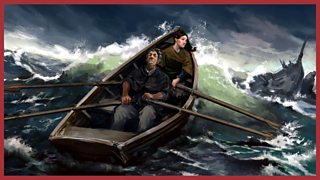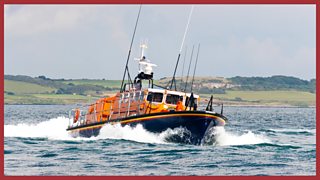People who help us: The RNLI - Grace Darling
Themes: People who help us; the RNLI; Grace Darling; courage and self-sacrifice.
Summary: This assembly takes seaside safety as its starting point before going to to explore the work of the RNLI, which was founded in 1824 and estimates it has saved 140,000 lives since then. One of the RNLI's lifeboats is named after Grace Darling and the video clip explores her extraordinary story.
Resources: an image of an (see 'Key links')
Key links
-
![]()
Print out the assembly framework ready for use
-
![]()
Click to display full-size if you are connected online
The video:

The video tells the story of Grace Darling (1815 - 1842). Grace was born in Bamburgh on the Northumberland coast but went to live on Brownsman Island in the Farne Islands, aged just three weeks old, because her father was the lighthouse keeper there. In 1838 Grace was living in a new lighthouse at Longstone when the SS Forfarshire was wrecked in sight of the lighthouse during a ferocious storm. Grace and her father rowed to the rescue, bringing nine survivors who had been clinging to rocks safely back to Longstone Lighthouse. After the rescue Grace received awards for her bravery; she also became a national celebrity, with presents sent to her from well-wishers all across the country - including Queen Victoria herself.
Duration: 4' 03"
End of speech: '...and determination to do something extraordinary.'
Story questions
How old was Grace when she moved to the Farne Islands?
Grace was just three weeks old.
Why did Grace move to the Farne Islands?
Grace's father was the lighthouse keeper on Brownsman Island.
How old was Grace when she moved to Longstone Lighthouse?
Grace was 10 years old when she and the family moved to the newly-built lighthouse at Longstone.
What did Grace see from her window on 7 September 1838?
A ship wrecked on the rocks with some survivors clinging to the rocks.
Why was Grace's father reluctant to try an immediate rescue?
Grace's father felt the sea was too rough and that they would have a better chance of success if they waited until morning and first light.
Suggested framework
| Content | Guidance |
|---|---|
| 1. Entry | Play your chosen music as the children enter and display the image of a RNLI lifeboat going to the rescue (see 'Key links'). There are several popular songs that feature the sea. There are also well-known evocations of the sea in classical music, including 'Storm' from '4 Sea Interludes' by Benjamin Britten; 'The Hebrides Overture' by Felix Mendelssohn and 'La Mer' by Claude Debussy (see 'Related links'). |
| 2. Introduction | If you have played music as the children enter you may wish to begin by putting the music in context and explaining its use. Then, ask the children: 'Who has been to the seaside? Was it for a day out or for a holiday?' [Gather responses]. Then ask: ‘Are there any golden rules for staying safe at the seaside?’ ‘What happens if we get in to difficulty at the seaside? Who can help us.’ [Gather responses]. Introduce the Coast Guards and the RNLI (Royal National Lifeboat Institution). Draw the children’s attention to the image of a lifeboat going to the rescue. Ask the children: 'Do you think people who are brave enough to work for the RNLI should be paid a lot of money?' Make the children aware that service for the RNLI is entirely voluntary. Introduce the fact that one of the RNLI’s 350 lifeboats is named 'Grace Darling' after a young woman who lived in Victorian times. ‘Now we’re going to watch a short video to find out why…’ |
| 3. The video | Play the video. The video is an animation of Grace telling us her story in her own words. The duration is 4' 03" and the final words are: '...use my courage and determination to do something extraordinary.' |
| 4. After the video. | You could use the Story questions (above right) to help the children focus on details of the story. 1: How old was Grace when she moved to the Farne Islands? (3 weeks old). 2: Why did she move there? (Her father was a lighthouse keeper there). 3: How old was Grace when she moved to Longstone Lighthouse? (10). 4: What happened on 7 September 1838? (Grace and her father went to the rescue of survivors of the SS Forfarshire). 5: Why didn't Grace's father want to try an immediate rescue? (He felt the weather made it too dangerous). |
| 5. Time to talk | Lead a discussion about Grace Darling and the men and women who volunteer for the RNLI: How do you think Grace was feeling before / during / and after the rescue? Would you say she was 'brave'? What does 'being brave' mean? What would it be like if we had no one to look after us at the seaside or in the sea? What can we all do to make sure we stay safe at the seaside and do not require emergency help? [Gather responses]. End by emphasising keeping safe at the seaside. The RNLI website has comprehensive guidance, which can be summarised as: swimming at beaches with life guards; understanding flags and signs; understanding tides and currents; using wetsuits when appropriate; understanding where it is appropriate to use an inflatable; understanding sun safety. |
| 6. Opportunity to sing | An opportunity to sing your chosen song. Suggestions from Â鶹ԼÅÄ collections below. |
| 7. Opportunity to reflect | 'Today we’ve heard what a powerful force the sea can be... And how we need to be alert to the power of the sea and take note of it... And we’ve heard about the selfless volunteers all over the country who crew the lifeboats and lifeboat stations of the RNLI... People willing to place themselves at risk to protect others... Think about a time when you’ve helped someone...even though you found it difficult to do it... And think also about how grateful you are to have people who help us in times of difficulty... In your heads you can say a silent 'Thank you' for their help...' |
| 8. Opportunity for prayer | You can turn the theme of the reflection into a prayer if you wish. Use your usual form of address ('Dear God' etc) and: 'Thank you for the beauty of the sea and the fun we can have at the seaside. And thank you for the lives of Grace Darling and all those people who help to keep us safe. Help us to remember not to take them for granted...and to make sure we do everything we can to be aware of risk and to keep ourselves safe.' |
Suggested songs
| Song | Collection | Significant words |
|---|---|---|
| 'Keep the golden rules' (Video - see 'Related links') | All about our school, no 5 | 'Every day's a good day / When we keep the golden rules' |
| 'Together' (Video - see 'Related links') | All about our school, no 13 | 'If there's trouble big or small / Gather round and find an answer' / 'We can ride the stormy weather' |


